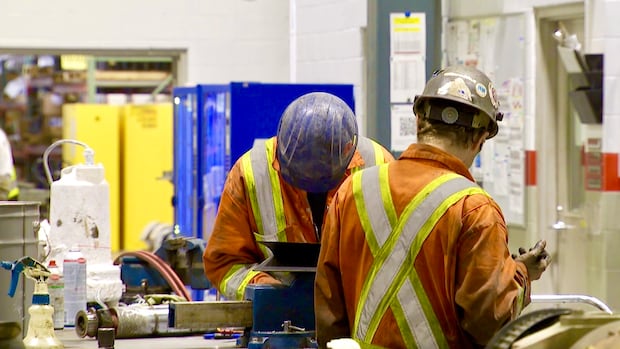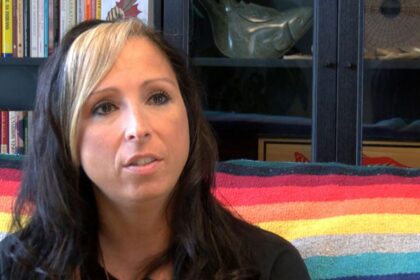CalgaryInstead of months, a federal program is now taking years to process the applications of skilled refugees living overseas and have a job waiting for them in Canada. Canadian businesses are unable to fill positions, while skilled refugees are also in limboKyle Bakx · CBC News · Posted: Nov 17, 2025 4:00 AM EST | Last Updated: 4 hours agoListen to this articleEstimated 4 minutesThe audio version of this article is generated by text-to-speech, a technology based on artificial intelligence.The difficulty of finding workers to fill jobs is leading some companies to hire refugees living internationally through the federal government’s Economic Mobility Pathways Pilot, but the program’s processing times are now increasing. (Sue Goodspeed/CBC)Instead of waiting months, a federal program is now taking years to process the applications of refugees who are living overseas and have a job waiting for them in Canada.As a result, some Canadian businesses are unable to fill positions, while skilled refugees are also in limbo and risk exploitation, arrest or detention. In 2018, the federal government launched the Economic Mobility Pathways Pilot (EMPP) for employers facing skill shortages to recruit internationally from within refugee populations. If approved, the individual is given permanent residency and can immigrate to Canada with their spouse and children.Since its inception, more than 1,200 people have been approved through the program to enter Canada, according to the federal government.Ottawa has touted the speed of the program as a strength, with processing times of just six months in most cases.But those wait times have increased to 54 months, according to a ministerial transition binder prepared in May for Immigration Minister Lena Diab. Ottawa is no longer living up to its promise to employers or refugees, said Dana Wagner, managing director of TalentLift Canada, a Toronto-based non-profit that helps Canadian employers hire refugees internationally when they can’t find suitable workers locally.”It’s extremely frustrating knowing the value of this program and knowing the potential and knowing how successful it’s been,” said Wagner. “Canada is no longer treating this applicant group like the skilled workers they are.”The number of displaced people globally has been rising for the last decade, says Dana Wagner, managing director of TalentLift. (Oliver Walters/CBC)Production cuts, lost revenueAs part of a survey, TalentLift heard from more than 20 businesses looking to hire through the EMPP and found the long wait times are resulting in production cuts, delayed expansion plans, cancelled projects and lost revenue.Meanwhile, some refugees are facing arrest, deportation, evictions or are struggling to feed their families while they wait to be accepted into Canada through the EMPP, said Wagner.“These are really extreme situations playing out while people have a job offer in Canada waiting for them, a workplace waiting and their visa is now, in some cases, a year over the promised processing time,” she said.”It just kind of makes you shake your head and say, ‘What’s going on here?'”Last week, Finance Minister François-Philippe Champagne said the government is aiming to bring immigration to “more sustainable levels.”“I think Canadians understand that we had reached our capacity — or sometimes even exceeded our capacity — to welcome [newcomers],” he said during a news conference before the budget was tabled.“On one hand [we’re] saying, ‘Yes, we’re getting back to sustainable levels.’ On the other hand, we’re really focusing on attracting the best and brightest.”Some of the skilled EMPP positions include nurses, health-care professionals, engineers, agriculture workers and construction tradespeople.WATCH | The ins and outs of hiring a temporary foreign worker in Canada:How the temporary foreign worker program works in CanadaEmployers must first post the job to find workers locally, says Peter Veress, president of Vermax Group, an immigration consulting firm. “We recognize that average processing times for the EMPP have risen which can be challenging. Currently, 80 per cent of complete EMPP applications are processed in about 17 months,” said Mary Rose Sabater, a spokesperson for Immigration, Refugees and Citizenship Canada, in an emailed statement.Processing times are influenced by immigration targets, the complexity of certain cases and how quickly applicants respond to requests for information, among other factors, she said.“The government of Canada understands the significance of this pilot for refugees and displaced persons, and also for employers and Canadian communities.”Changing attitudes toward immigrationOverall, Ottawa has reduced the targets for both permanent and temporary residents over the next three years.An Environics Institute poll released last month found that 56 per cent of Canadians say Canada is admitting too many immigrants — a number that has moved sharply higher in the last five years. In recent years, the overall surge of population growth has tested the housing market, health-care capacity and other government services.WATCH | The changing mood in Canada toward immigration:Have Canadians’ attitudes toward immigration soured?New polling from the Environics Institute suggests more than half of Canadians believe the country accepts too many immigrants. The CBC’s J.P. Tasker breaks down these findings. Plus, Power & Politics asks former federal immigration minister Jason Kenney why the decline is more significant among Conservative voters.ABOUT THE AUTHORKyle Bakx is a Calgary-based journalist with the network business unit at CBC News. He files stories from across the country and internationally for web, radio, TV and social media platforms. You can email story ideas to kyle.bakx@cbc.ca. More by Kyle Bakx
Federal refugee employment program faces ‘extremely long, ballooning wait times’











